
Google rolled out the November 2023 reviews update on November 8, 2023 and announced it is moving to more of a continuous rollout (so the November update will probably be the last reviews update announced). That’s unless significant changes to the system are implemented (like expanding to additional languages or other major changes implemented). As a quick refresh, the update launched in April of 2021 and just evaluated product reviews at that point. That’s why it was originally named the Product Reviews Update (PRU). Then with the April 2023 reviews update, it moved to evaluating any content providing recommendations, reviews, analysis, etc.
The various reviews updates have caused serious volatility across many sites providing product reviews, especially affiliate sites looking to earn money from those reviews. And with the transition in April of 2023, the update now impacts any site “with the purpose of providing a recommendation, giving an opinion, or providing analysis.” Also, reviews can be about any topic and across any vertical. So the system has greatly expanded.
I have had many companies reach out to me after dropping heavily when reviews updates roll out. In addition, and this is something I have documented many times in posts and presentations about the reviews system, some sites have experienced insane volatility over time as they surge and drop often (even outside of official reviews updates). For example, here are two examples of that in action:
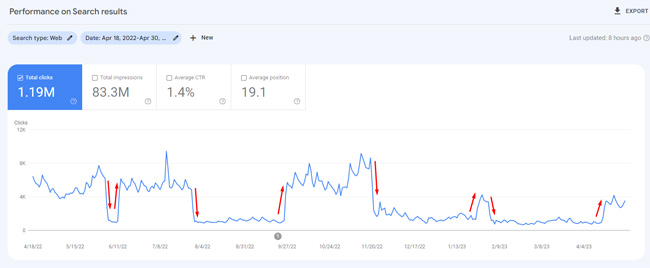
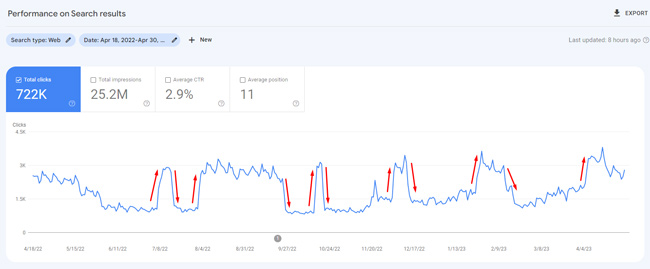
Imagine being a site owner with trending like that… Good luck trying to plan for anything.
And with the November 2023 reviews update, Google announced that the reviews system is now “improved at a regular and ongoing pace”. So Google will not be posting about future updates (unless there’s a significant change that they want site owners to know about). For example, if the system expands to additional languages.
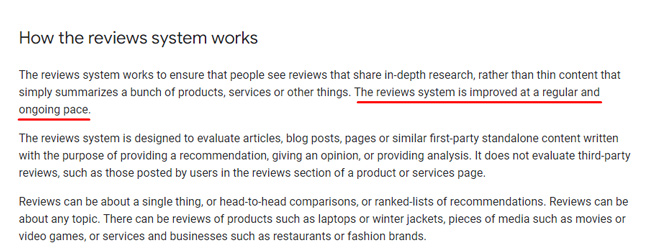

(Future) impact based on the reviews system: The significance of ‘continual improvement’.
Regarding moving to running continually, that is something that Google’s John Mueller explained could happen in a search central hangout video back in April of 2021. I made sure to share about that at the time. Here is the video of John explaining this:
By the way, this is similar to when Panda got baked into Google’s core ranking system in 2016, never to be heard of again. And I feel like the reviews system could be the same way. For example, if your site is impacted by the reviews system moving forward, and it’s not during a specific reviews update, how will you absolutely know it was the reviews system impacting your site? Well, you won’t, just like when Panda moved to Google’s core ranking algorithm.
Here’s a slide from one of my SMX presentations where I explained the reviews update would probably be baked into Google’s core ranking algorithm at some point:
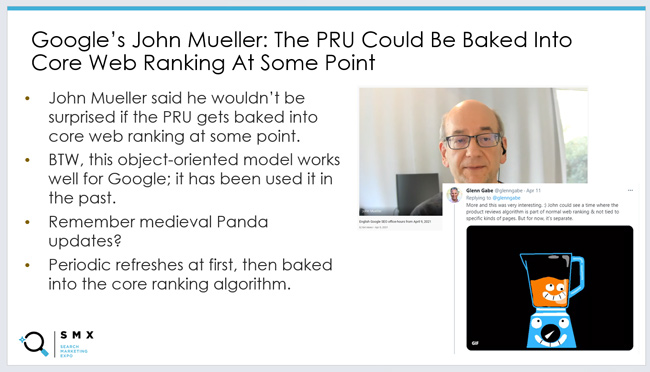
The November 2023 Reviews Update: Reviewing the review sites (visibility-wise).
With the launch of the November 2023 reviews update, I wanted to check how sites were performing that had been heavily impacted one of the previous reviews updates. So, I ended up checking the visibility trending for about seven hundred sites that had been previously impacted by product reviews updates or reviews updates. I checked their search visibility from before the first reviews update in April of 2021 and then checked their visibility as of November 25, 2023.
I quickly started seeing a trend, and it wasn’t pretty.
Many of the sites had been obliterated and haven’t recovered… at all. Once ranking for many competitive queries, the sites now either barely rank, or they have basically shut down. It’s incredible to see the impact of what an algorithm update like this can do over time. And to be clear, I’m not saying these were all great sites… they weren’t. But looking back in time enabled me to see how Google could craft a system to tackle a specific problem (thin and low-quality reviews) and how that system could rock many sites focused on reviews.
Here’s a quick snapshot of what I saw when running the visibility numbers across seven hundred sites:
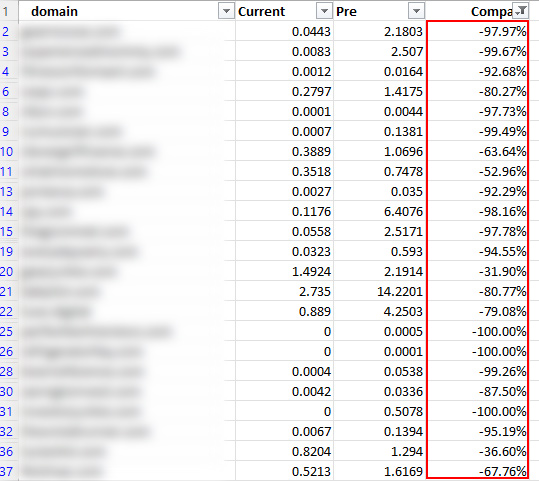
Note, Google created the reviews system to surface the highest-quality reviews content, so it was built for the right reasons, but the impact has been jaw-dropping. And I’ll explain soon why this should be alarming for sites impacted by Google’s helpful content update (especially the September HCU).
Here are some examples so you can see the massive impact many of these sites have experienced. Notice that several of the sites have been impacted by multiple types of updates as well. So yes, the reviews update has impacted the sites heavily, but so have broad core updates, spam updates, and helpful content updates.
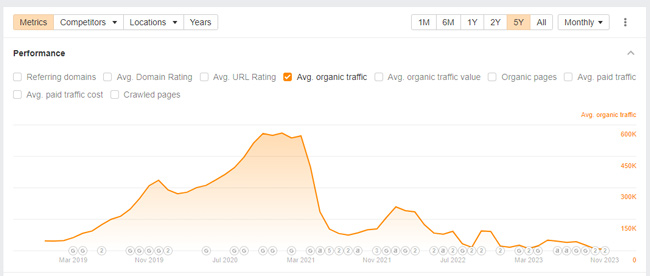
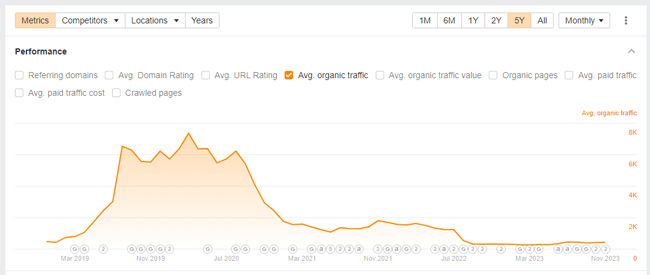
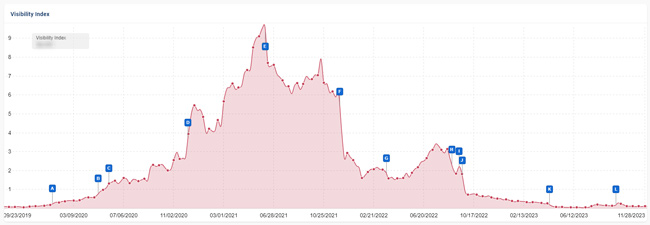
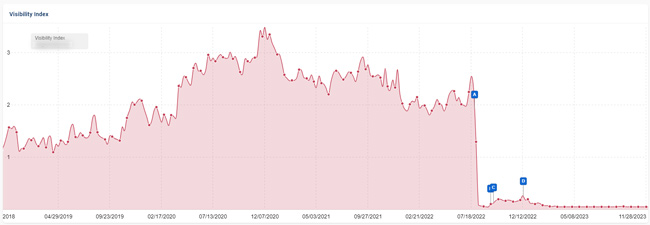
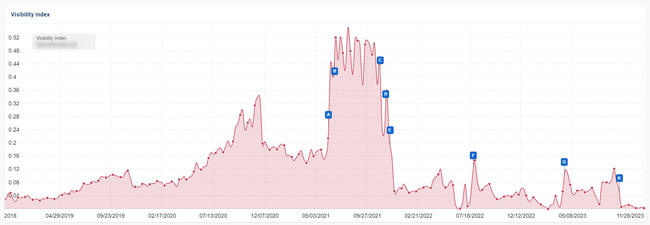
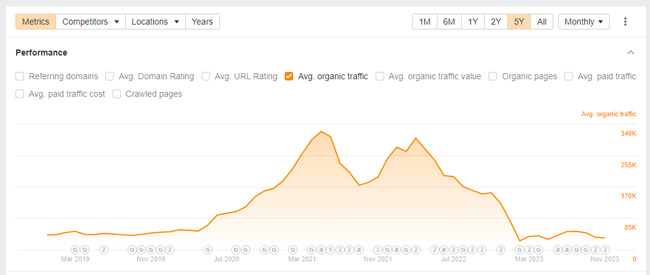
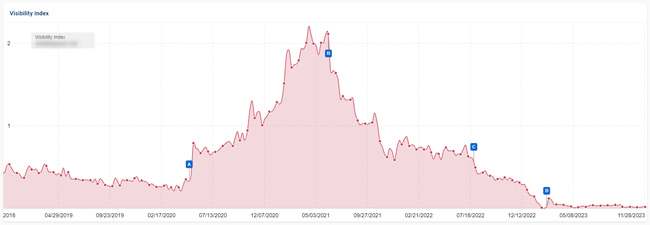
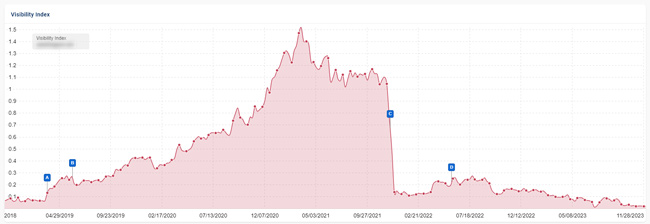
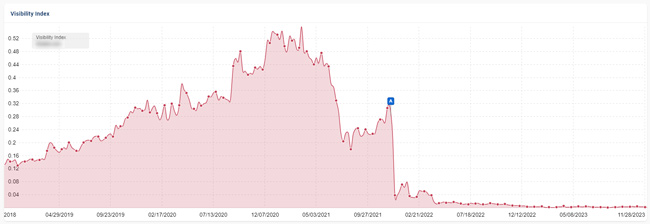
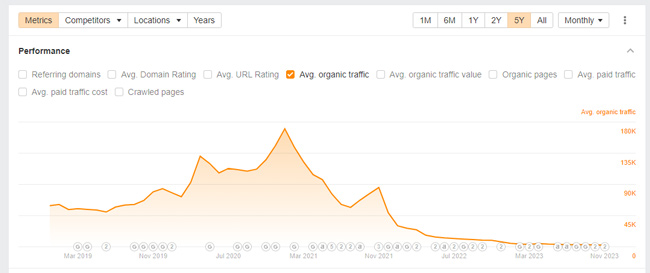
And I can keep going… it was wild to see the massive drops over time with no little or no recovery. Many of the sites are unfortunately in a very serious state right now. And that got me thinking about the September helpful content update (HCUX), which I’ll cover next.
What this means for sites impacted by Google’s helpful content update, especially the September 2023 HCU(X):
Back to the September helpful content update, or HCU(X), which was a huge update. Many sites got hammered by the update, dropping by 70%+ overnight. Many of the drops were extreme, which reminded me of some of the drops I have seen with sites impacted by reviews updates over time. And after reviewing many sites that were impacted in September of 2023, I believe many of them have a lot of work to do in order to improve, and possibly recover.
For example, if a site has been heavily impacted by the HCU(X), then it’s algorithmically being classified as “unhelpful” by Google. Site owners will need to improve significantly over time in order for that classifier to be dropped. Google has explained that it can take months of doing the right things in order for the classifier to be dropped and a site recover. In other words, the percentage of “unhelpful content” must decrease heavily over time in order for the classifier to be dropped (and that could lead to recovery).
So yes, sites can recover from an HCU hit, but so could review sites… And many didn’t. At all.
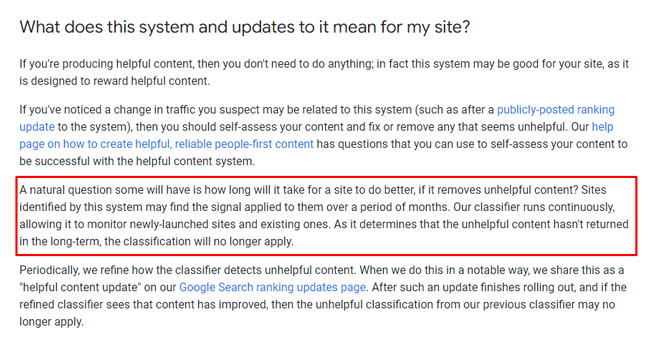
The HCU is continually running now, so sites technically don’t need to wait for another official helpful content update to recover. But the reality is that the recoveries I have seen have occurred during official helpful content updates (when the classifier has been improved or other major changes implemented). I wonder if that will change over time with more sites seeing recovery outside of those specific updates… Time will tell.
Regardless, the most important point is that sites heavily impacted by the HCU(X) in September should work hard to clearly get out of the gray area of Google’s algorithms… and have the classifier dropped. If not, those sites will continue along at the (low) visibility levels they are at now. And for many, that’s not a viable situation business-wise. Just check the trending I shared earlier across those review sites that never recovered.
A reminder about the gray area of Google’s algorithms: A maddening place for site owners to live.
For site owners impacted by the HCU, it’s important to CLEARLY get out of the gray area. If not, you may never recover. And worse, you may never know how close you are to recovering. I have covered this concept many times over the years, especially when medieval Panda roamed the web. I helped many companies that were impacted by Panda and the ones that saw the quickest recovery, and with the largest surges, usually tackled big problems in big ways. They did not cherry pick changes or just moderately improve. They chose to significantly improve over time.
You can read my post about the September HCU(X) for more information about the problems I saw across sites from a content and UX standpoint. If you were heavily impacted by the September helpful content update, then I highly recommend addressing those issues fully. Implementing minor changes will probably not help your situation (which is similar to review sites that were heavily impacted by the reviews update and didn’t address their problems fully). As documented earlier, that didn’t end well for many of those sites.
It’s also important to remember that machine learning is being used with major algorithm updates like broad core updates, the reviews update, and the helpful content update. That means many signals are sent to a machine learning system, which dictates weighting of those signals, and ultimately rankings. It’s not a simple ‘if-then’ statement… So make sure your site has the ability to creep out of the gray area so the HCU classifier can be dropped.
If you can significantly improve, your site can recover. But if you don’t do enough to pass Google’s algorithmic evaluation, you could remain down heavily (with no understanding of how close you are to recovery). Again, that’s a maddening place to live for site owners.
Good luck.
GG

